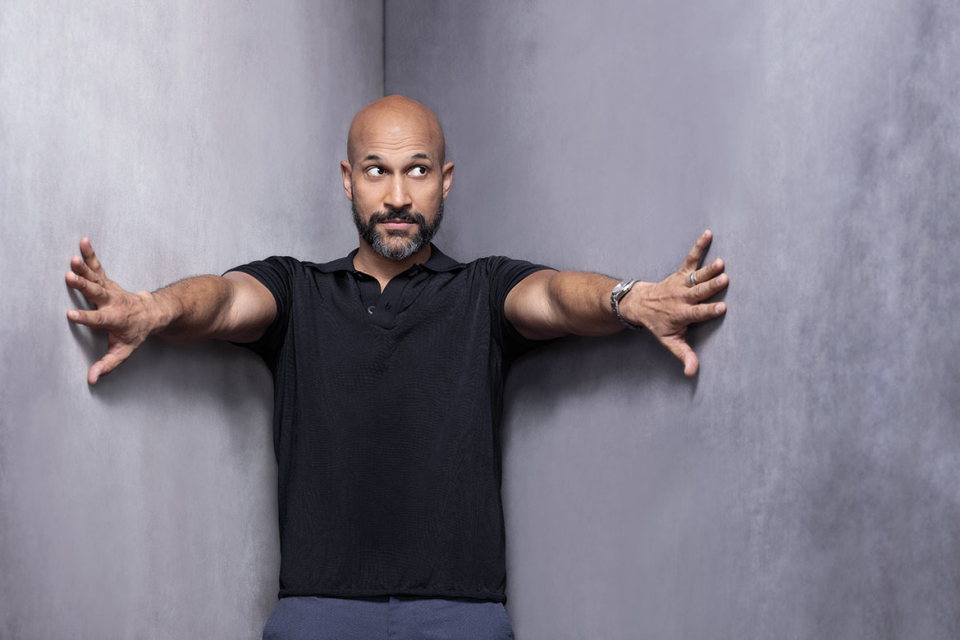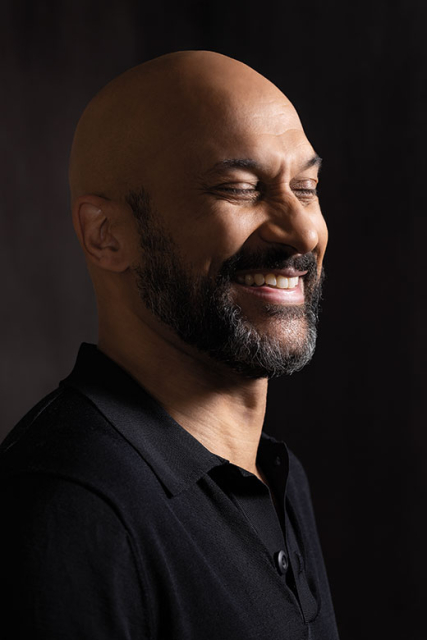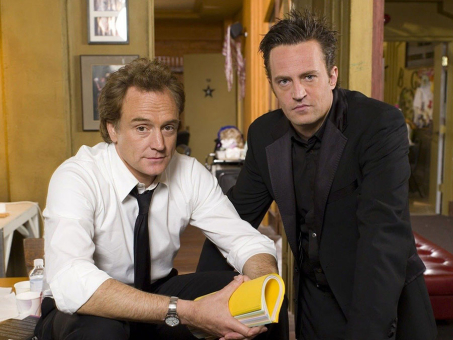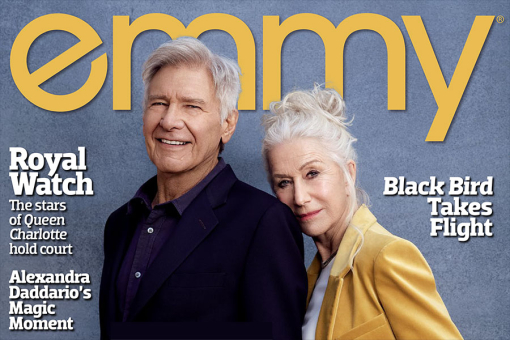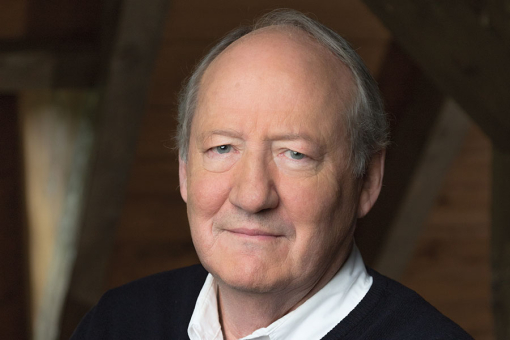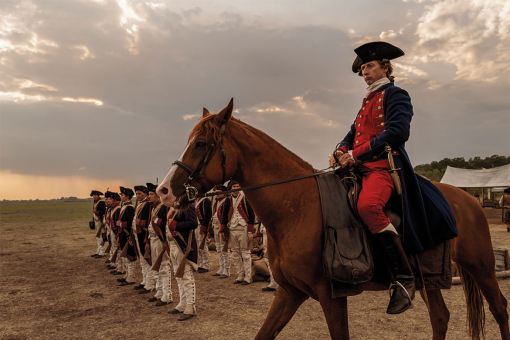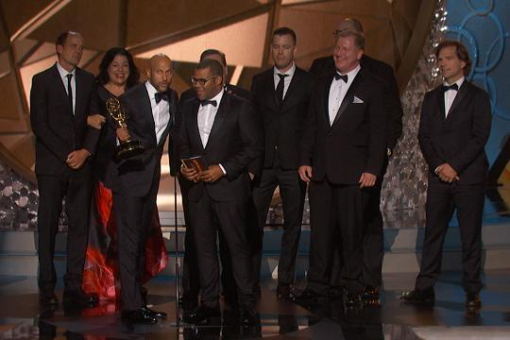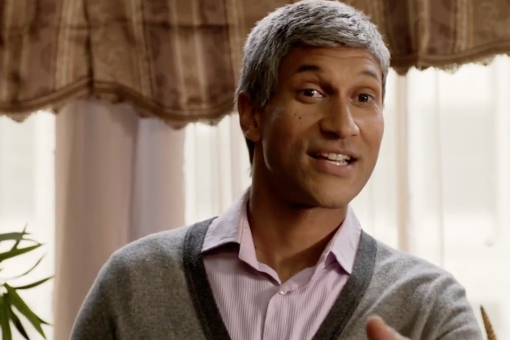Steven Levitan didn't need further proof that the actor he'd hired to play pompous has-been Reed Sterling for his Hulu sitcom Reboot was a man of many talents. But actor-comedian-writer Keegan-Michael Key has a way of reminding you of his range when you least expect it.
In Levitan's case, that happened at his own wedding last September, when Key unexpectedly interrupted the post-nuptials revelry by taking the mic to perform a full-throated rendition of Chris Stapleton's "Tennessee Whiskey" — as if outlaw country star were simply one more arrow in an already packed quiver. "It blew the place away," Levitan recalls. "It was a highlight of the night and I just thought, 'I can't imagine anything that he's not capable of.'"
Disappearing into a role excites Key, who with Jordan Peele turned chameleonic aptitude into a side-splitting art on their Emmy- and Peabody Award-winning sketch show Key & Peele. As he contemplates the lunch menu at a Los Angeles hotel restaurant, Key recalls drinking up sketch comedy as a kid and thinking that within the form's shape-shifting facade lay the entirety of acting.
"They have a wig on, they're limping and they have an Australian accent, so it means they're acting, because it's not who they are in real life," Key explains. "Eddie Murphy and Carol Burnett weren't playing personas of themselves. I call it 'quantitative acting' because you're checking things off. That was how I saw acting."
Now, years removed from playing comic extremes in behavior, look and background week after week, whether on The Second City's improv comedy stages, or on Mad TV or in his iconic partnership with Peele, Key is thrilled by what he calls "qualitative acting" — exploring a character over a longer period. Instead of the thumbnail markers of a wig, walk or dialect, as he puts it, it's about "trying to figure out what's going to trigger you internally."
On Reboot, which imagined a cheesy sitcom being revived with its original, now more desperate cast, Key could tap into his own years of navigating the ups and downs of show business. "I'm one of those guys that went to graduate school and loved Shakespeare," he says, "but not so much that I wouldn't take a job that I thought was helpful financially."
Key's attraction to genuineness and imagination, to a great role inside a big idea, is what pulled him into Schmigadoon!, the winking show tunes homage in which he stars with Cecily Strong as a couple who stumble into a parallel universe of singing and dancing characters. Inspired by classic Broadway musicals, the Apple TV+ show — releasing new episodes weekly through May 5 — is both a comic romance about relationship foibles and strengths, and a rapturous parody of theater. The first season referenced Americana classics (The Music Man, Oklahoma!), while this season, set in "Schmicago," takes on a reimagined world of darker '70s-era shows (Chicago, Sweeney Todd). Key was instantly taken by the premise from cocreator-showrunner Cinco Paul (Despicable Me, The Lorax).
"First of all, I adore musicals," Key says. "And then two words: Cecily Strong. That was all I needed to hear. But once I started hearing the music, I thought, 'This is going to be special.' And it is."
Key unpacks why the reality-meets-fantasy DNA of Schmigadoon! spoke to him. "It's funny — my two favorite things are things that comment on things, and things that are the most earnest, so what attracted me was the meta aspect," says Key, whose everyday-guy character, Josh, is initially horrified at being stuck in a 360-degree show tunes world and cracks wise about the genre's sillier aspects. "I thought it was brilliant on Cinco's part to create a character that can take people who don't like musicals and walk them through this. They have their representative. And yet he also moves through the story in a way that's classic, because it's Josh who sets up a lot of the obstacles they have to overcome."
A pair of Second City vets like Key and Strong, meanwhile, had nothing to overcome with each other, except perhaps a joyful addiction to keeping an improvised bit going, whether cameras are rolling or not. "We couldn't let scenes end," recalls Strong, a recent Saturday Night Live alum. "He finds the funniest thing in every scene. First season, we called each other the 'button' twins. If I said, 'That's not a normal sandwich shop,' Keegan would have to go, 'But what's a normal sandwich?' And we'd improvise for fifteen minutes." When a new director — Robert Luketic (Jane the Virgin) — came in for the second season, Strong says a warning was necessary. "We said, 'We're going to have a million [endings] if you don't call Cut! We're both such nerds.'"
For Key, that gleeful play meant he'd found a scene partner he could trust the way he did Peele. "There's a real sense of safety," he says, describing a feeling that surely helped when Covid restrictions limited rehearsal time. "Very often in improv circles in Chicago, before you would walk onstage, people would tap each other on the back and say, 'I got your back.' I always feel like she has my back. She's so sharp and lovely."
He feels the same about his wife and writing partner, Elle Key, whom he calls "instrumental" with career decisions. "She's such a genuine person and wants the best for everyone," Key says, citing a moment in the making of their Webby-winning podcast The History of Sketch Comedy, which he hosted and she cowrote and directed. Key had been struggling with his narration delivery when she told him to consider their grade-school nephew and eighty-six-year-old aunt. "She goes, 'Honey, it's like you're telling Adrian and Penny the same story, so they both understand everything you're saying.' She's a fantastic director."
It may not be shocking to hear that Key's childhood in Detroit was marked by the impulse to entertain everyone around him with jokes and impersonations. But it takes a different mindset to believe that the thing you love doing could be the thing you keep doing into adulthood. For him, it began with being swept away by movies, achieved liftoff with television and then crystallized onstage.
"Movies were the most magical thing I'd ever experienced," Key says, citing the fantastical realms available on the multiplex screens of his childhood, from Star Wars to The Wiz to Pete's Dragon. "But I never thought I was going to be in a movie. The gateway was sketch. It's bite-sized, not overwhelming, and you have a bit of control. You're not writing a play. You're making a teacher laugh, or the kids you talked to and joked with."
Eddie Murphy's meteoric first season on Saturday Night Live was one lightbulb flickering on for an eager young performer. "I'm looking at my father just cackling at this kid — and he was a kid, for God's sake — and I go, 'Someone who looks like me can do that?' I mean, this is a phrase we hear a lot these days, but I felt seen. It's almost as if he was reaching out to people like me."
But so were British comedians like Lenny Henry, thanks to the fact that a Detroit television could pick up Canadian programming, which featured a healthy dose of U.K. shows, from procedurals to soaps to the edgiest comedies. When Key's parents divorced and his father married a Belfast-born British citizen, her tastes spurred him further — starting with how she sounded. "I wanted to learn British and Irish accents," Key says, "so I watched all this British programming. I adored her and I wanted to impress her."
They were going to plays more often, too, so the last piece of the puzzle was getting cast as Jesus in his high school's production of Godspell, and what an auditorium's attention conferred. "I remember performing and feeling like there's a number of people sitting out there in the dark, but they're one organism, and you're communicating with that single organism. I went, 'That's it. I am not going to be a veterinarian.'"
Key studied acting, earning his bachelor's degree in theater at the University of Detroit Mercy, where school productions brought in the city's professional actors and were reviewed by local critics. "It was run like a rep company," he says. Then he attained a master's in theater at Pennsylvania State University, where the training got "granular." After learning the nuts and bolts of improv at Second City in Detroit and Chicago, Key got his big break at age thirty-three when he landed Mad TV, where the addition of cameras between him and a studio audience brought an extra layer of performance modulation to think about when getting laughs from a gonzo character.
"I learned you can't just go crazy," he says, recalling that the production needed a word-perfect take before looser takes, so a skit could be edited together. "You had to keep in mind the thread of the scene. I learned so much about camera on that show."
Once he and his Mad TV colleague Peele secured their own showcase in 2012, the smash Comedy Central hit Key & Peele, they started turning sketches into short films, deploying different visual styles, playing a wider range of eccentrics, and for Key, honing a valuable lesson about camera acting. "If you think the thought, the camera will pull it out of you," he says, noting how the volume and breadth of a given sketch would change based on what the scene needed. "At Key & Peele there was more subtlety in the work. It was so much fun because there were times when you can just be goofy as shit, and other times when you're trying to be as focused and intense as you can."
He's especially proud of what he calls their "switch-hitter" style of comedy teaming, where either could play straight man or clown. In the case of characters like the valets — neither was an antagonist, both were simply enthusiastic fans of pop culture — they presented a shared excitement he calls "peas in a pod" comedy. "We tried to run the gamut," Key says.
Their popularity was never greater than when Key got to perform fan-favorite Luther, "anger translator" to Peele's imitation of cool-headed President Obama, at the White House Correspondents' Dinner in 2015 — but with a certain A-list substitute for his regular costar. "It didn't hit me until three seconds before I went onstage," he says of playing Luther opposite Obama himself. "I was like, 'Oh shit, that's me,' and 'Oh my God, we're literally doing this with the leader of the free world.' It was surreal. I remember Jordan said, 'When does a character in fiction do the same thing in real life?' It was like I walked out of the television."
For some aspiring young comic actor somewhere, perhaps he did exactly that, the way Eddie Murphy seemed to for him. When you consider, too, the self-referential aspects of Reboot and Schmigadoon!, Key just may be the meta actor of the moment — believable in the moment and true to a character, yet drawing laughs from what's unreal. "Am I the new meta man? I don't know," he says. "I just think those kinds of projects are a magnet for me." (A few weeks after this interview, when Reboot's cancelation was announced, Key sent a suitably upbeat email about the meta-ness, calling it "an exciting opportunity for someone down the line to make a 'reboot Reboot.'")
Mostly, Key just wants to continue leaning into versatility and different energies, staying on the journey of showcasing the range that sketch comedy started and his latest roles have burnished. Always ready with a reference, he mentions one of his favorite actors, Gary Oldman. "He could change dialect but it's almost like he used it to tap into a different part of the essence of himself," he says. "Some people, you always know exactly what you're going to get. But a Gary Oldman or a Peter Sellers, the constancy is the inconstancy. It's, 'I don't know what I'm going to get from him this time.'"
Schmigadoon! was cocreated by executive producer-showrunner Cinco Paul and Ken Daurio. Lorne Michaels and Andrew Singer are also executive producers, and the show is produced by Universal Television and Broadway Video.
Reboot was executive produced by Steven Levitan, Jeff Morton and Danielle Stokdyk, and the show was produced by Steven Levitan Productions and Twentieth Television.
This article originally appeared in emmy magazine issue #3, 2023, under the title, "Heavy Meta."

